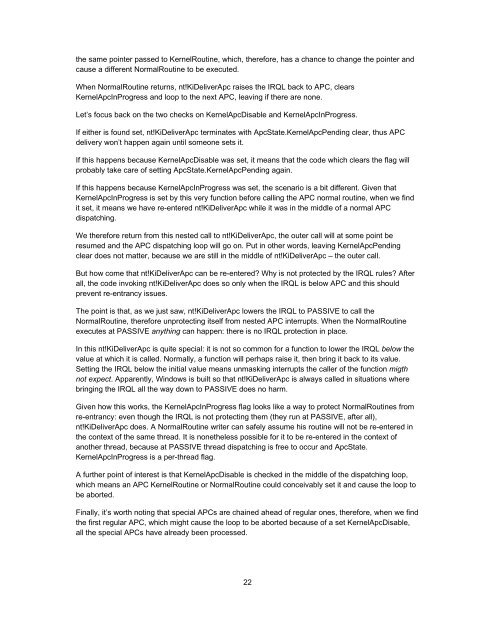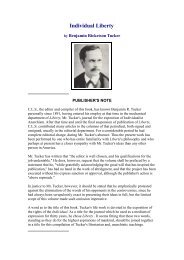366.7 KB - Evernote
366.7 KB - Evernote
366.7 KB - Evernote
Create successful ePaper yourself
Turn your PDF publications into a flip-book with our unique Google optimized e-Paper software.
the same pointer passed to KernelRoutine, which, therefore, has a chance to change the pointer and<br />
cause a different NormalRoutine to be executed.<br />
When NormalRoutine returns, nt!KiDeliverApc raises the IRQL back to APC, clears<br />
KernelApcInProgress and loop to the next APC, leaving if there are none.<br />
Let’s focus back on the two checks on KernelApcDisable and KernelApcInProgress.<br />
If either is found set, nt!KiDeliverApc terminates with ApcState.KernelApcPending clear, thus APC<br />
delivery won’t happen again until someone sets it.<br />
If this happens because KernelApcDisable was set, it means that the code which clears the flag will<br />
probably take care of setting ApcState.KernelApcPending again.<br />
If this happens because KernelApcInProgress was set, the scenario is a bit different. Given that<br />
KernelApcInProgress is set by this very function before calling the APC normal routine, when we find<br />
it set, it means we have re-entered nt!KiDeliverApc while it was in the middle of a normal APC<br />
dispatching.<br />
We therefore return from this nested call to nt!KiDeliverApc, the outer call will at some point be<br />
resumed and the APC dispatching loop will go on. Put in other words, leaving KernelApcPending<br />
clear does not matter, because we are still in the middle of nt!KiDeliverApc – the outer call.<br />
But how come that nt!KiDeliverApc can be re-entered? Why is not protected by the IRQL rules? After<br />
all, the code invoking nt!KiDeliverApc does so only when the IRQL is below APC and this should<br />
prevent re-entrancy issues.<br />
The point is that, as we just saw, nt!KiDeliverApc lowers the IRQL to PASSIVE to call the<br />
NormalRoutine, therefore unprotecting itself from nested APC interrupts. When the NormalRoutine<br />
executes at PASSIVE anything can happen: there is no IRQL protection in place.<br />
In this nt!KiDeliverApc is quite special: it is not so common for a function to lower the IRQL below the<br />
value at which it is called. Normally, a function will perhaps raise it, then bring it back to its value.<br />
Setting the IRQL below the initial value means unmasking interrupts the caller of the function migth<br />
not expect. Apparently, Windows is built so that nt!KiDeliverApc is always called in situations where<br />
bringing the IRQL all the way down to PASSIVE does no harm.<br />
Given how this works, the KernelApcInProgress flag looks like a way to protect NormalRoutines from<br />
re-entrancy: even though the IRQL is not protecting them (they run at PASSIVE, after all),<br />
nt!KiDeliverApc does. A NormalRoutine writer can safely assume his routine will not be re-entered in<br />
the context of the same thread. It is nonetheless possible for it to be re-entered in the context of<br />
another thread, because at PASSIVE thread dispatching is free to occur and ApcState.<br />
KernelApcInProgress is a per-thread flag.<br />
A further point of interest is that KernelApcDisable is checked in the middle of the dispatching loop,<br />
which means an APC KernelRoutine or NormalRoutine could conceivably set it and cause the loop to<br />
be aborted.<br />
Finally, it’s worth noting that special APCs are chained ahead of regular ones, therefore, when we find<br />
the first regular APC, which might cause the loop to be aborted because of a set KernelApcDisable,<br />
all the special APCs have already been processed.<br />
22
















